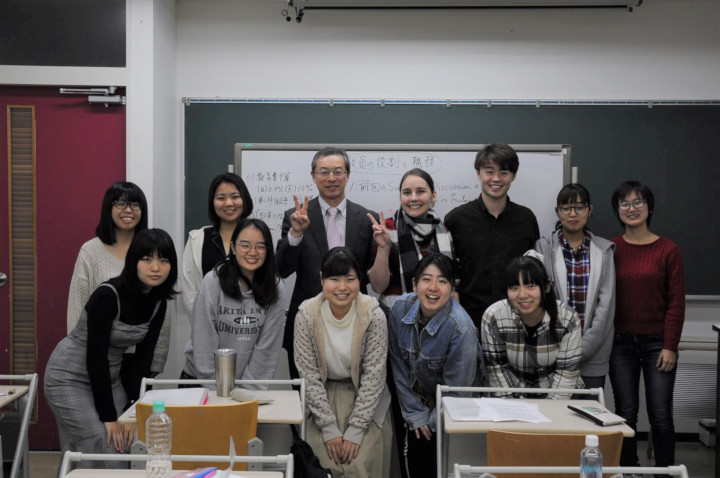AIU TOPICS
AIU Voices
What It Means to Be an “International Community”: Liisa Toivonen, Tampere University, Finland

Liisa (rear, center) with classmates and professor in the Careers in Teaching course.
“Umm, I’m the person who e-mailed you.”
The professor was a Japanese man in his 50s or 60s, and he had those quintessentially Japanese features that made him look stern and kind at the same time. I probably looked like a scared mouse – I had never had to speak Japanese to a professor before.
“Oh, yes. This class is conducted entirely in Japanese, is that okay?”1
“I’d like to try my best,” I mumbled, and escaped to the back of the class where I figured observers belonged. Japanese students began to file into the room, which was bright and hot even though it was already late in the evening. The teacher opened a window and soon enough a creepy bug flew in from the darkness outside. (Japan really needs to initiate some top-tier genetic engineering government program to make the bugs smaller and less creepy.)
Eventually the teacher began talking, explaining the syllabus and giving insights on the first topic of discussion – the meaning of being a teacher. I hung on to every word, but still grasped just a fraction of what he was saying – his speech was littered with words I’d never heard, which made most sentences uninterpretable. It was as if somebody had bleeped most of the words he was saying, and I had to guess his meaning from the tenth of his speech that was audible to me.
But I didn’t mind – I was in a classroom filled with future colleagues, listening to a lecture in Japanese with a breeze way too warm for August blowing into the room, accompanied by the loud but beautiful singing of unfamiliar bugs. It was surreal, picturesque, and quite literally everything I had hoped for when I applied to AIU over other Japanese universities. Plus, I didn’t have to embarrass myself speaking Japanese anymore.
“Sekkaku dakara, let’s have everyone come to the front and introduce themselves.”
Oh man. Surely not the dumb foreigner?
Yes, the teacher nodded.
By the end of the class, I had managed a self-introduction, a writing assignment, and a group discussion. My performance was far from impressive, but I left feeling happy. Despite my linguistic deficiencies, I was never left out of anything.
Week after week, I kept coming back to that warm classroom, even though I felt guilty for making my teacher and classmates sometimes explain things in English just for my sake. It seemed entitled.
“Nobody thinks that way”, one of them said to me before a class. “You know, any one of us will help you if you need it.”
I stopped sitting in the back.
Several lectures, group discussions, reaction papers, and one field trip later, I could participate in the class without several hours of preparation.
Neither my teacher nor my classmates had any obligation to help me – they could’ve left me in the back. But instead of ignoring me they encouraged me, challenged me, and helped me to grow as a person.
It turns out all you need to overcome a huge challenge is hard work and the support of a caring, accepting, cosmopolitan community like AIU.
So, what’s your challenge going to be?
1The Teacher’s License Program is a series of courses outside the curriculum designed to prepare students to take the Japanese government’s exam to become a licensed teacher. All curricular courses at AIU are taught in English.
